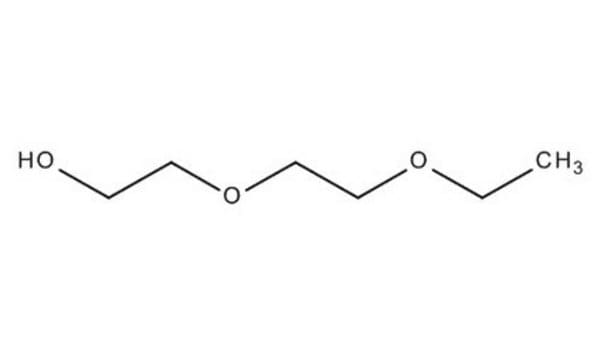8.02933
Diethylene glycol dibutyl ether
for synthesis
Synonym(s):
Diethylene glycol dibutyl ether
About This Item
Recommended Products
vapor pressure
0.01 hPa ( 20 °C)
Quality Level
assay
≥98.0% (GC)
form
liquid
autoignition temp.
268 °C
potency
3900 mg/kg LD50, oral (Rat)
3555 mg/kg LD50, skin (Rabbit)
bp
254 °C/1013 hPa
mp
-60 °C
transition temp
flash point 118 °C
solubility
3 g/L
density
0.88 g/cm3 at 20 °C
storage temp.
2-30°C
InChI
1S/C12H26O3/c1-3-5-7-13-9-11-15-12-10-14-8-6-4-2/h3-12H2,1-2H3
InChI key
KZVBBTZJMSWGTK-UHFFFAOYSA-N
Application
- Transport and Association of Ions in Lithium Battery Electrolytes Based on Glycol Ether Mixed with Halogen-Free Orthoborate Ionic Liquid: This study explores the solvent properties of glycol ethers, including diethylene glycol dibutyl ether, in enhancing the performance of lithium battery electrolytes. The findings suggest that these solvents facilitate superior ionic mobility, potentially improving battery efficiency and safety (Shah FU, et al., 2017).
- Glymes as new solvents for lipase activation and biodiesel preparation: Diethylene glycol dibutyl ether is highlighted as an effective solvent for lipase activation, which is crucial in biodiesel production. This application demonstrates the solvent′s potential in biofuel technologies, enhancing enzyme activity and stability (Tang S, et al., 2013).
- Extraction and carrier-facilitated transport of amino acids using synthetic non-cyclic receptors through bulk liquid membrane: This research indicates the utility of diethylene glycol dibutyl ether in the selective transport and extraction of amino acids across synthetic membranes, offering insights into its applications in biotechnological and pharmaceutical industries (Joshi P, et al., 2006).
Analysis Note
Density (d 20 °C/ 4 °C): 0.882 - 0.884
Peroxide (as H₂O₂): ≤ 0.005 %
Identity (IR): passes test
Storage Class
10 - Combustible liquids
wgk_germany
WGK 1
flash_point_f
244.4 °F - closed cup
flash_point_c
118 °C - closed cup
Certificates of Analysis (COA)
Search for Certificates of Analysis (COA) by entering the products Lot/Batch Number. Lot and Batch Numbers can be found on a product’s label following the words ‘Lot’ or ‘Batch’.
Already Own This Product?
Find documentation for the products that you have recently purchased in the Document Library.
Our team of scientists has experience in all areas of research including Life Science, Material Science, Chemical Synthesis, Chromatography, Analytical and many others.
Contact Technical Service







